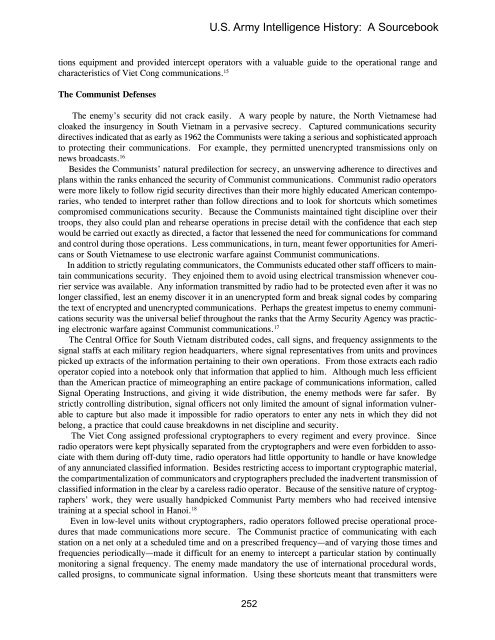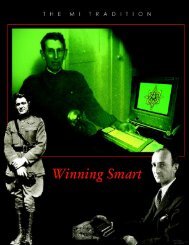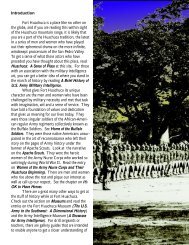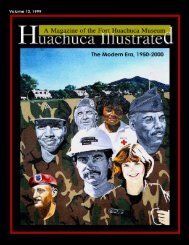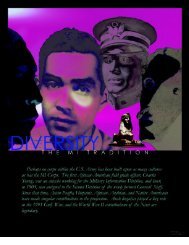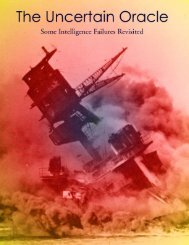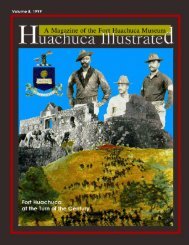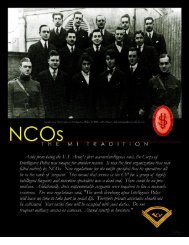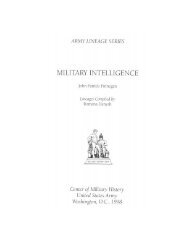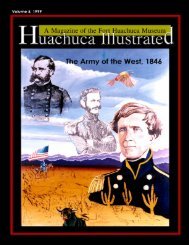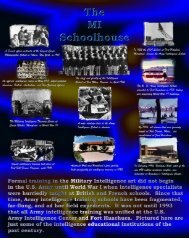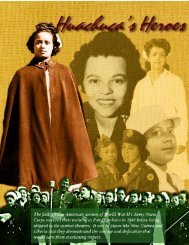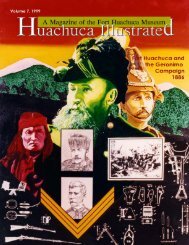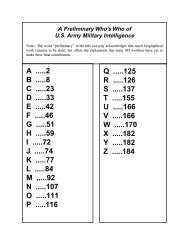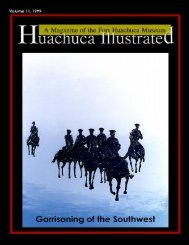- Page 1 and 2:
1U.S. Army Military Intelligence Hi
- Page 3 and 4:
RALPH VAN DEMAN * Historical Sketch
- Page 5:
OVERSIGHT AND INVESTIGATIONS SUBCOM
- Page 8 and 9:
U.S. Army Intelligence History: A S
- Page 10 and 11:
U.S. Army Intelligence History: A S
- Page 12 and 13:
U.S. Army Intelligence History: A S
- Page 14 and 15:
U.S. Army Intelligence History: A S
- Page 16 and 17:
U.S. Army Intelligence History: A S
- Page 18 and 19:
U.S. Army Intelligence History: A S
- Page 20 and 21:
U.S. Army Intelligence History: A S
- Page 22 and 23:
U.S. Army Intelligence History: A S
- Page 24 and 25:
U.S. Army Intelligence History: A S
- Page 26 and 27:
U.S. Army Intelligence History: A S
- Page 28 and 29:
U.S. Army Intelligence History: A S
- Page 30 and 31:
U.S. Army Intelligence History: A S
- Page 32 and 33:
U.S. Army Intelligence History: A S
- Page 34 and 35:
U.S. Army Intelligence History: A S
- Page 36 and 37:
U.S. Army Intelligence History: A S
- Page 38 and 39:
U.S. Army Intelligence History: A S
- Page 40 and 41:
U.S. Army Intelligence History: A S
- Page 42 and 43:
U.S. Army Intelligence History: A S
- Page 44 and 45:
U.S. Army Intelligence History: A S
- Page 46 and 47:
U.S. Army Intelligence History: A S
- Page 48 and 49:
U.S. Army Intelligence History: A S
- Page 50 and 51:
U.S. Army Intelligence History: A S
- Page 52 and 53:
U.S. Army Intelligence History: A S
- Page 54 and 55:
U.S. Army Intelligence History: A S
- Page 56 and 57:
U.S. Army Intelligence History: A S
- Page 58 and 59:
U.S. Army Intelligence History: A S
- Page 60 and 61:
U.S. Army Intelligence History: A S
- Page 62 and 63:
U.S. Army Intelligence History: A S
- Page 64 and 65:
U.S. Army Intelligence History: A S
- Page 66 and 67:
U.S. Army Intelligence History: A S
- Page 68 and 69:
U.S. Army Intelligence History: A S
- Page 70 and 71:
U.S. Army Intelligence History: A S
- Page 72 and 73:
U.S. Army Intelligence History: A S
- Page 74 and 75:
U.S. Army Intelligence History: A S
- Page 76 and 77:
U.S. Army Intelligence History: A S
- Page 78 and 79:
U.S. Army Intelligence History: A S
- Page 80 and 81:
U.S. Army Intelligence History: A S
- Page 82 and 83:
U.S. Army Intelligence History: A S
- Page 84 and 85:
U.S. Army Intelligence History: A S
- Page 86 and 87:
U.S. Army Intelligence History: A S
- Page 88 and 89:
U.S. Army Intelligence History: A S
- Page 90 and 91:
U.S. Army Intelligence History: A S
- Page 92 and 93:
U.S. Army Intelligence History: A S
- Page 94 and 95:
U.S. Army Intelligence History: A S
- Page 96 and 97:
U.S. Army Intelligence History: A S
- Page 98 and 99:
U.S. Army Intelligence History: A S
- Page 100 and 101:
U.S. Army Intelligence History: A S
- Page 102 and 103:
U.S. Army Intelligence History: A S
- Page 104 and 105:
U.S. Army Intelligence History: A S
- Page 106 and 107:
U.S. Army Intelligence History: A S
- Page 108 and 109:
U.S. Army Intelligence History: A S
- Page 110 and 111:
U.S. Army Intelligence History: A S
- Page 112 and 113:
U.S. Army Intelligence History: A S
- Page 114 and 115:
U.S. Army Intelligence History: A S
- Page 116 and 117:
U.S. Army Intelligence History: A S
- Page 118 and 119:
U.S. Army Intelligence History: A S
- Page 120 and 121:
U.S. Army Intelligence History: A S
- Page 122 and 123:
U.S. Army Intelligence History: A S
- Page 124 and 125:
U.S. Army Intelligence History: A S
- Page 126 and 127:
U.S. Army Intelligence History: A S
- Page 128 and 129:
U.S. Army Intelligence History: A S
- Page 130 and 131:
U.S. Army Intelligence History: A S
- Page 132 and 133:
U.S. Army Intelligence History: A S
- Page 134 and 135:
U.S. Army Intelligence History: A S
- Page 136 and 137:
U.S. Army Intelligence History: A S
- Page 138 and 139:
U.S. Army Intelligence History: A S
- Page 140 and 141:
U.S. Army Intelligence History: A S
- Page 142 and 143:
U.S. Army Intelligence History: A S
- Page 144 and 145:
U.S. Army Intelligence History: A S
- Page 146 and 147:
U.S. Army Intelligence History: A S
- Page 148 and 149:
U.S. Army Intelligence History: A S
- Page 150 and 151:
U.S. Army Intelligence History: A S
- Page 152 and 153:
U.S. Army Intelligence History: A S
- Page 154 and 155:
U.S. Army Intelligence History: A S
- Page 156 and 157:
U.S. Army Intelligence History: A S
- Page 158 and 159:
U.S. Army Intelligence History: A S
- Page 160 and 161:
U.S. Army Intelligence History: A S
- Page 162 and 163:
U.S. Army Intelligence History: A S
- Page 164 and 165:
U.S. Army Intelligence History: A S
- Page 166 and 167:
U.S. Army Intelligence History: A S
- Page 168 and 169:
U.S. Army Intelligence History: A S
- Page 170 and 171:
U.S. Army Intelligence History: A S
- Page 172 and 173:
U.S. Army Intelligence History: A S
- Page 174 and 175:
U.S. Army Intelligence History: A S
- Page 176 and 177:
U.S. Army Intelligence History: A S
- Page 178 and 179:
U.S. Army Intelligence History: A S
- Page 180 and 181:
U.S. Army Intelligence History: A S
- Page 182 and 183:
U.S. Army Intelligence History: A S
- Page 184 and 185:
U.S. Army Intelligence History: A S
- Page 186 and 187:
U.S. Army Intelligence History: A S
- Page 188 and 189:
U.S. Army Intelligence History: A S
- Page 190 and 191:
U.S. Army Intelligence History: A S
- Page 192 and 193:
U.S. Army Intelligence History: A S
- Page 194 and 195:
U.S. Army Intelligence History: A S
- Page 196 and 197:
U.S. Army Intelligence History: A S
- Page 198 and 199:
U.S. Army Intelligence History: A S
- Page 200 and 201:
U.S. Army Intelligence History: A S
- Page 202 and 203: U.S. Army Intelligence History: A S
- Page 204 and 205: U.S. Army Intelligence History: A S
- Page 206 and 207: U.S. Army Intelligence History: A S
- Page 208 and 209: U.S. Army Intelligence History: A S
- Page 210 and 211: U.S. Army Intelligence History: A S
- Page 212 and 213: U.S. Army Intelligence History: A S
- Page 214 and 215: U.S. Army Intelligence History: A S
- Page 216 and 217: U.S. Army Intelligence History: A S
- Page 218 and 219: U.S. Army Intelligence History: A S
- Page 220 and 221: Preface to Second VolumeThe volumes
- Page 222 and 223: U.S. Army Intelligence History: A S
- Page 224 and 225: U.S. Army Intelligence History: A S
- Page 226 and 227: U.S. Army Intelligence History: A S
- Page 228 and 229: U.S. Army Intelligence History: A S
- Page 230 and 231: U.S. Army Intelligence History: A S
- Page 232 and 233: U.S. Army Intelligence History: A S
- Page 234 and 235: U.S. Army Intelligence History: A S
- Page 236 and 237: U.S. Army Intelligence History: A S
- Page 238 and 239: U.S. Army Intelligence History: A S
- Page 240 and 241: U.S. Army Intelligence History: A S
- Page 242 and 243: U.S. Army Intelligence History: A S
- Page 244 and 245: U.S. Army Intelligence History: A S
- Page 246 and 247: U.S. Army Intelligence History: A S
- Page 248 and 249: U.S. Army Intelligence History: A S
- Page 250 and 251: U.S. Army Intelligence History: A S
- Page 254 and 255: U.S. Army Intelligence History: A S
- Page 256 and 257: U.S. Army Intelligence History: A S
- Page 258 and 259: U.S. Army Intelligence History: A S
- Page 260 and 261: U.S. Army Intelligence History: A S
- Page 262 and 263: U.S. Army Intelligence History: A S
- Page 264 and 265: U.S. Army Intelligence History: A S
- Page 266 and 267: U.S. Army Intelligence History: A S
- Page 268 and 269: U.S. Army Intelligence History: A S
- Page 270 and 271: U.S. Army Intelligence History: A S
- Page 272 and 273: U.S. Army Intelligence History: A S
- Page 274 and 275: U.S. Army Intelligence History: A S
- Page 276 and 277: U.S. Army Intelligence History: A S
- Page 278 and 279: U.S. Army Intelligence History: A S
- Page 280 and 281: U.S. Army Intelligence History: A S
- Page 282 and 283: U.S. Army Intelligence History: A S
- Page 284 and 285: U.S. Army Intelligence History: A S
- Page 286 and 287: U.S. Army Intelligence History: A S
- Page 288 and 289: U.S. Army Intelligence History: A S
- Page 290 and 291: U.S. Army Intelligence History: A S
- Page 292 and 293: U.S. Army Intelligence History: A S
- Page 294 and 295: U.S. Army Intelligence History: A S
- Page 296 and 297: U.S. Army Intelligence History: A S
- Page 298 and 299: U.S. Army Intelligence History: A S
- Page 300 and 301: U.S. Army Intelligence History: A S
- Page 302 and 303:
U.S. Army Intelligence History: A S
- Page 304 and 305:
U.S. Army Intelligence History: A S
- Page 306 and 307:
U.S. Army Intelligence History: A S
- Page 308 and 309:
U.S. Army Intelligence History: A S
- Page 310 and 311:
U.S. Army Intelligence History: A S
- Page 312 and 313:
U.S. Army Intelligence History: A S
- Page 314 and 315:
U.S. Army Intelligence History: A S
- Page 316 and 317:
U.S. Army Intelligence History: A S
- Page 318 and 319:
U.S. Army Intelligence History: A S
- Page 320 and 321:
U.S. Army Intelligence History: A S
- Page 322 and 323:
U.S. Army Intelligence History: A S
- Page 324 and 325:
U.S. Army Intelligence History: A S
- Page 326 and 327:
U.S. Army Intelligence History: A S
- Page 328 and 329:
U.S. Army Intelligence History: A S
- Page 330 and 331:
U.S. Army Intelligence History: A S
- Page 332 and 333:
U.S. Army Intelligence History: A S
- Page 334 and 335:
U.S. Army Intelligence History: A S
- Page 336 and 337:
U.S. Army Intelligence History: A S
- Page 338 and 339:
U.S. Army Intelligence History: A S
- Page 340 and 341:
U.S. Army Intelligence History: A S
- Page 342 and 343:
U.S. Army Intelligence History: A S
- Page 344 and 345:
U.S. Army Intelligence History: A S
- Page 346 and 347:
U.S. Army Intelligence History: A S
- Page 348 and 349:
U.S. Army Intelligence History: A S
- Page 350 and 351:
U.S. Army Intelligence History: A S
- Page 352 and 353:
U.S. Army Intelligence History: A S
- Page 354 and 355:
U.S. Army Intelligence History: A S
- Page 356 and 357:
U.S. Army Intelligence History: A S
- Page 358 and 359:
U.S. Army Intelligence History: A S
- Page 360 and 361:
U.S. Army Intelligence History: A S
- Page 362 and 363:
U.S. Army Intelligence History: A S
- Page 364 and 365:
U.S. Army Intelligence History: A S
- Page 366 and 367:
U.S. Army Intelligence History: A S
- Page 368 and 369:
U.S. Army Intelligence History: A S
- Page 370 and 371:
U.S. Army Intelligence History: A S
- Page 372 and 373:
U.S. Army Intelligence History: A S
- Page 374 and 375:
U.S. Army Intelligence History: A S
- Page 376 and 377:
U.S. Army Intelligence History: A S
- Page 378 and 379:
U.S. Army Intelligence History: A S
- Page 380 and 381:
U.S. Army Intelligence History: A S
- Page 382 and 383:
U.S. Army Intelligence History: A S
- Page 384 and 385:
U.S. Army Intelligence History: A S
- Page 386 and 387:
U.S. Army Intelligence History: A S
- Page 388 and 389:
U.S. Army Intelligence History: A S
- Page 390 and 391:
U.S. Army Intelligence History: A S
- Page 392 and 393:
U.S. Army Intelligence History: A S
- Page 394 and 395:
U.S. Army Intelligence History: A S
- Page 396 and 397:
U.S. Army Intelligence History: A S
- Page 398 and 399:
U.S. Army Intelligence History: A S
- Page 400 and 401:
U.S. Army Intelligence History: A S
- Page 402 and 403:
U.S. Army Intelligence History: A S
- Page 404 and 405:
U.S. Army Intelligence History: A S
- Page 406 and 407:
U.S. Army Intelligence History: A S
- Page 408 and 409:
U.S. Army Intelligence History: A S
- Page 410 and 411:
U.S. Army Intelligence History: A S
- Page 412 and 413:
U.S. Army Intelligence History: A S
- Page 414 and 415:
U.S. Army Intelligence History: A S
- Page 416 and 417:
U.S. Army Intelligence History: A S
- Page 418 and 419:
U.S. Army Intelligence History: A S
- Page 420 and 421:
IndexSymbols101st Airborne Division
- Page 422 and 423:
Badham, William 144Baghdad baby mil
- Page 424 and 425:
Canan, Howard V. 28Canzona, Nichola
- Page 426 and 427:
Deutsch, Harold C. 166, 178, 179, 1
- Page 428 and 429:
Furlong, John 74, 75, 76Futrell, Fr
- Page 430 and 431:
Hoai Nhon district 239Hobar, Basil
- Page 432 and 433:
Katz, Friedrich 89Keegan, John 166K
- Page 434 and 435:
Mahon, John K. 14, 57Major Army Com
- Page 436 and 437:
Morgan, Charles 20Morgan, Frederick
- Page 438 and 439:
Photo interpreter teams, training i
- Page 440 and 441:
Sandburg, Carl 29Sargent, Frank B.
- Page 442 and 443:
Stuart, Meriwether 44, 45Sudley Spr
- Page 444 and 445:
WWaberski, Pablo [see Witzke] 84, 1


